ONLINE TEXTS AND JOURNALS
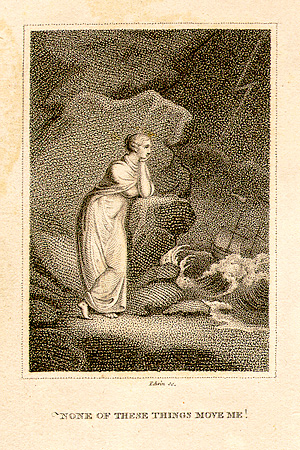
From Smith Engravings Collection
Edgar
Fahs Smith Memorial Library in the History of Chemistry
No information about
the source of this engraving has been found.
Online texts that interest Traister are many and varied. With respect to
ALL sources listed here, however, users should be VERY CAUTIOUS
about the textual authority/authoritativeness of texts available online. That
authority, like the weather, will vary--and, also like the weather, with some
degree of unpredictibility.
Online publishers--even scholarly ones, if they cannot get permission from
copyright holders of modern editions--frequently use out-of-copyright editions
as the basis for the texts they scan and input. Thus the degree to which their
texts might not pass muster with contemporary, or even relatively recent,
textual scholars (and this without reference to the imperfections that can be
produced by the process of scanning itself) is, too often for comfort, a
question they would prefer you did not ask.
Increasingly, you can find scholarship about texts, as well as texts
themselves, in electronic form. Its status (refereed? non-refereed?) can raise
questions similar to those raised by the editorial practices that underlie
online texts. In short: caveat lector.
That granted, several people have been thinking about what these texts, this
Home Page, and the web itself are all about. See, for instance:
- Vannevar Bush, writing as long ago as 1945, and Martin S. Greenberg, writing nineteen years later
- Wendy M. Grossman, net.wars (New
York: New York University Press, 1998)
- Stanley N.
Katz, "A Computer is Not a Typewriter, or Getting Right with Information
Technology in the Humanities"
- Scholarly Uses
of the Web
- John Tolva, "Ut
Pictura Hyperpoesis: Spatial Form, Visuality, and the Digital
Word"
- Guaraldi.it
(English version; a site for a commercial venture where people are thinking
about the impact of the web)
- James A. Dewar, "The
Information Age and the Printing Press: Looking Backward to See Ahead"
(RAND)
- David J. Farber's home
page (Penn)
- A different view is provided by William H. Gass, "Gutenberg's Triumph: An Essay in
Defense of the Book"
An electronic discussion group called HUMANIST exists to
facilitate academic consideration of online computing and its uses, including
online texts.
Alex: A
Catalog of Electronic Texts on the Internet can be consulted via the
Web.
The On-Line Books Page
from the University of Pennsylvania Library web provides a wealth of
resources
Athenaeum: A Free Virtual
Library is Zachary Chandler's effort (at Duke University) "to monitor
online library projects and provide a convenient gateway to superior
sources."
One basic online text (available here to Penn users; guests may apply at the
EB's URL, http://www.eb.com/) is the Encyclopedia Britannica. Another is OED. See also the OED
site. A specialized dictionary resource (for
early modern usage) is The Early Modern
English Dictionaries Database.
Chadwyck-Healey's Literature Online, a
full-text searchable online database, is currently available to people with
valid Penn i.p.s
Also available only to people with valid Penn i.p.s is The
Johns Hopkins Guide to Literary Theory & Criticism
Two amazingly useful literary sites include:
The Bible:
1. RENAISSANCE LITERATURE: TEXTS AND
STUDIES
- Generally, see:
- Jack Lynch's
Renaissance resources
- The
Online Medieval and Classical Library
- Renaissance Electronic
Texts
- Early Modern
Literary Studies: Electronic Texts
- See the various "Alchemy"--now
called "Luminaria"--databases, which include medieval, Renaissance, and
seventeenth-century texts, at http://www.luminarium.org/lumina.htm
- Perseus Project (Tufts
University; so far [9 May 1997], this is a list of texts planned for
inclusion at this site)
- Center
for Electronic Text & Image (in early stages of development and operation
at the University of Pennsylvania's Van Pelt-Dietrich Library's Department of
Special Collections)
- Proper Elizabethan Accents
is, as it name indicates, a specialized resource (and can require plug-ins for
sound)
- The web provides multiple texts of and information about William
Shakespeare.
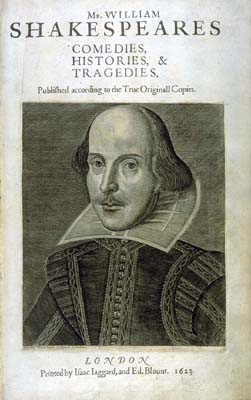
These include
texts scanned from early editions in the Horace
Howard Furness Memorial [Shakespeare] Library of the Department of Special
Collections at the University of Pennsylvania's Van Pelt-Dietrich Library. Now
available are texts that include (but are not limited to):
- the
1611 quarto edition of Hamlet
- the
1623 First Folio edition of Hamlet
- William
D'Avenant's Hamlet, 1676
- the
"1608" [i.e., 1619] quarto edition of King Lear
- the
1623 First Folio edition of King Lear
- Nahum
Tate's The History of King Lear, 1681
- King
Lear, as edited by Alexander Pope, 1723
A Useful Teaching Tool for Shakespearians (from The
Onion)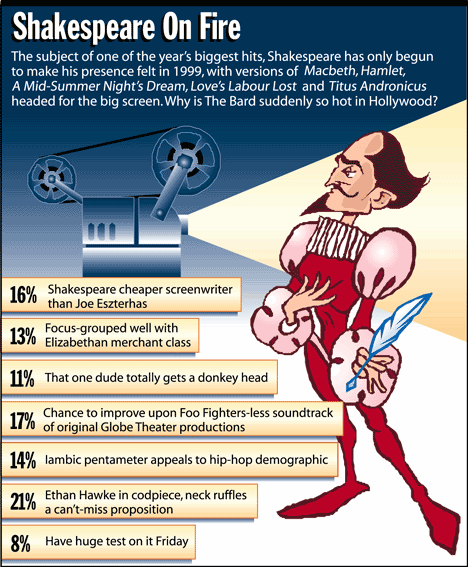
- Other Shakespearian links--very numerous, as one would
expect--include:
- MIT's Shakespeare Home
Page
- World
Shakespeare Bibliography Online
- Mr. William Shakespeare and the
Internet
- Internet Shakespeare Editions, including
Sites on
Shakespeare and the Renaissance and Shakespeare's Life
and Times, from Michael Best, University of
Victoria
- The McGill
Shakespeare Resources Page
- The Shakespeare Web
- Shake Sphere
- Shakespeare's
Globe Online
- Surfing for
Shakespeare: English Renaissance Literature on the Web (from C. M. Bajetta,
Research Fellow and University Lecturer, Università Cattolica del Sacro
Cuore, Milano)
- A. C. Bradley, Shakespearean
Tragedy
- Materials for the Construction of
Shakespeare's Morals: The Stoic Legacy to the Renaissance. Major Ethical
Authorities, Indexed According to Virtues, Vices, and Characters from the
Plays, as well as Topics in Swift, Pope, and Wordsworth: The Full Texts in
English Translation, Scanned, Digitized, Commented on and Annotated (from
Ben R. Schneider, Lawrence University, Appleton, WI)
- The Julius Caesar Site
(Tufts University)
- Sir Peter Hall's Troilus
and Cressida and the Tradition of the Play
- Shake-speares
Sonnets (1609), ed. Hardy M. Cook and Ian Lancashire (Renaissance
Electronic Texts [RET 3.1])
- The Folger Shakespeare Library
- Hilda D.
Spear, "The Elizabethan Theatre" (from the Universiteit Köln)
- Shakespeare database CD-ROM
information
- Shakespeare's
will (facsimile)
- Shakespeare
Illustrated (NOTE: one of the most interesting nineteenth-century
artists who also illustrated Shakespeare was Richard Dadd (1817-1886))
- Laurie Osborn's home
page (with material on writing critically about Shakespeare in hyperspace)
- Rebecca Bushnell's Home
Page (relevant to Renaissance literary studies generally as well as to
Shakespeare studies)
- The Hamlet Home
Page
- Bernice Kliman's Enfolded
Hamlet
- King
Lear: The Complete Text (with Quarto and Folio Variations), Annotations,
and Commentary (Larry A. Brown)
- Ed Friedlander's "Enjoying
King Lear" Page
- Cordelia, King
Lear, and His Fool (a King Lear website)
- Shakespeare
Festivals on the WWW
- The Shakespeare Globe Centre
Australia Inc. is a charitable organisation with a broad charter of the
promotion of Shakespearean arts and education in Australia
- Shakespeare Magazine (web
version)
- Educating
Shakespeare (School life in Elizabethan England -- from Keith Parker and
the Guild School Association of Stratford-upon-Avon)
- Norman N.
Holland, "My Shakespeare in Love"
- Poor Yorick Shakespeare Multimedia
Catalogue (a commercial site for Shakespeare productions)
- contemporary with Shakespeare is Christopher Marlowe
- John Webster's The
Duchess of Malfi is available online (Larry A. Brown).
- see also the Thomas
Middleton Home Page
- Gabriel Egan's
Non-Shakespearean Drama Database
- Cambridge English
Renaissance Electronic Service
- Richard Bear's
Renascence Editions: Works in English, 1500-1799 (University of Oregon)
makes available many works, including (but not limited to):
- Everyman
- Thomas More, History of
King Richard III
- other Renaissance Ricardian texts (most of them
excerpted) are accessible through a website created by the American branch of
the Richard III Society
- Sir Thomas
Hoby's 1561 translation of Baldesar Castiglione's Book of the
Courtier
- Roger Ascham, The
Scholemaster (1570)
- George Gascoigne's
The Steele Glas & the Complaynt of Philomene (1576)
- William Goddard, A
Neaste of VVaspes (1615)
- Sir Philip Sidney's Defence of
Poetry, The Lady of
May, and Astrophil and
Stella
- Robert Garnier's
Tragedie of Antonie, translated by Mary Sidney, Countess of Pembroke
(1595)
- Thomas
Campion, The Art of English Poesie
- Samuel Daniel,
Delia and Samuel Daniel, A Defence
of Rhyme
- Henry Constable,
Diana (1594)
- Lady Mary Wroth,
Pamphilia to Amphilanthus
- The King and Queenes
Entertainement at Richmond (September 12, 1636)
- Richard Bear's general site provides
many additional texts, to say nothing of his own works
- Edmund Spenser: The Edmund Spenser Home Page makes
available Edmund Spenser's Faerie Queene, Shepherd's Calendar,
Four Hymns, and much else; see also Spenser On-Line
- Sir Philip Sidney:
- The Philip Sidney Home
Page
- Sidney
Journal
- Sir
Philip Sidney Online
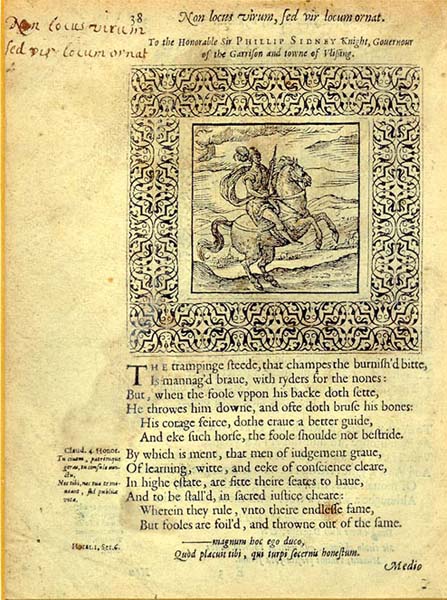 From Geoffrey Whitney,
A choice of emblemes . . . (Leiden: Christopher Plantin, 1586), sig.
E1r (p. 38);
From Geoffrey Whitney,
A choice of emblemes . . . (Leiden: Christopher Plantin, 1586), sig.
E1r (p. 38);
the gift to Traister of Francis O.
Mattson
- Bibliotheca
Augustana (Latin texts: ancient, medieval, post-medieval--NOTE:
"AppleMac et Netscape his paginis optimum visum dant!")
- C.E.T.E.:
Centre d'Edition de Textes Electroniques (various medieval and later texts,
in French)
- Schoenberg Center For
Electronic Text & Image, The Walter H. And Leonore Annenberg Rare Book and
Manuscript Library, Van Pelt-Dietrich Library, University of Pennsylvania
- Renaissance
Electronic Texts, already listed above, includes The Elizabethan
Homilies 1623 and Robert Cawdrey's
Table alphabetical of hard usual English words (1604)
- Giovanni Baptista
della Porta's Natural Magick (in English translation)
- Francis F. Steen's Reftoration Print
Culture (sic; the site's title uses a swash "f rather than a
long "s")
- Is he "medieval" or "Renaissance"? Whatever . . . see Otfried Lieberknecht's
Homepage for Dante Studies.
- Emblem books:
- Alciato's Book
of emblems
- Compendio
de Emblemas Españoles Ilustrados, by John T. Cull, Antonio Bernat
Vistarini, and Edward J. Vodoklys, S.J. (Universitat de les Illes Balears and
the College of the Holy Cross, Worcester, MA)
- Glasgow University Emblem
Website
- Emblem Books in
Leiden. A Catalogue of the Collections of Leiden University Library
- The English Emblem Book
Project (Penn State University)
- Pietro Vasolli da
Fivizano's Italian translation of Horapollon's Hieroglyphica
(printed by Giolito, Venice 1547)
- Studiolum also provides
Horapollo, as well as several other texts
- Amaro Lagrimar:
The Poems of Vittoria Colonna -- in an English translation by Ellen
Moody
- See Moody's essay about
translating Colonna
- See also the larger site -- Three Women Poets (Veronica
Gambara, Vittoria Colonna, and Anne Kingsmill Finch, Countess of Winchilsea) --
of which the Colonna site is part
- Golden Age Spanish Sonnets
- John Donne
- Printed Heritage
of Newfoundland and Labrador, sixteenth- and seventeenth-century texts (as
of September 1996, all English-language), mounted by Professor Hans-Josef
Rollmann, Religious Studies, Memorial University of Newfoundland
- John Dee and the English
Calendar (this is a paper about this subject)
- For alchemy, see Adam McLean's Alchemy Web Site
- Electronic
Texts in the History of Medicine (i.e., popular medical works, 16th through
18th centuries), from the Historical Medical Library,
Yale University; see, e.g., Nicholas
Culpeper, The English Physitian (1652).
- WWW Virtual
Library: History of Science, Technology & Medicine (from the Australian
Science Archives Project and the University of Melbourne; texts are from many
periods, not the Renaissance only)
- See also GGRENir:
Internetography on Renaissance intellectual history. This site is organized
by Dr. Heinrich C. Kuhn,
Seminar für Geistesgeschichte der Renaissance,
Ludwig-Maximilians-Universität München. The entire site is worth
extensive exploration. Of special additional interest may be Kuhn's resources in
intellectual history,
- Aemilia Lanyer
- Bartleby has mounted, e.g., Chapman's Homer.
- Pre-1600 English
Balads
- The
Richard Lovelace Page
- Among sites devoted to John Milton are:
- The
Milton Reading Room (Thomas H.
Luxon, Dartmouth College)
- The Milton-L Home Page
- The Milton Review
- John Milton's Paradise
Lost
- John
Milton
See also the texts mounted by Richard Bear's Renascence
Editions:- Areopagitica
- Comus, A Masque
- Milton: Shorter
Poems
- Of
Education
- Paradise Lost
(1667; in 10 books)
- Paradise
Regained
- Samson
Agonistes
- Renaissance
Texts Research Centre, University of Reading (U.K.).
- Early Modern Literary
Studies (the periodical, not the texts, for which, see above).
- Elizabethan
monetary equivalents
Take special note of Meng Wong's concordance
program, which can perform an astonishing variety of tasks with e-texts
that have been downloaded in machine-readable form. If you wonder what these
tasks might be, read the program's introductory matter carefully.
2. OTHER TEXTS AND STUDIES
Traister's literature page includes sites
relevant to many periods and individual authors. The principles by which its
listings differ from those to be found here are obscure, even to Traister; they
may not, in fact, exist; therefore the curious, the needy, or those with time
to kill should look at both places.
- The Oxford Book of
English Verse, ed. Arthur Quiller-Couch
- Representative
Poetry On-Line (University of Toronto)
- Bartlett's
Quotations
- Eighteenth-century
resources (from Jack Lynch's Home Page)
- Anthologies
and Miscellanies
- The Rape of the Lock
Home Page
- Jonathan Swift,
Gulliver's Travels
- The
Spectator Project (from Rutgers University: "an interactive hypermedia
environment for the study of The Tatler (1709-1711), The
Spectator (1711-14), and the eighteenth-century periodical in general")
- The Hume Archives
- Rictor Norton's
Homosexuality in Eighteenth-Century England: A Sourcebook
- William Blake; see also
The William Blake Archive at
the University of Virginia
- Samuel Taylor
Coleridge and William Wordsworth, Lyrical Ballads
- William
Godwin
- Eliza Parsons, The
Castle of Wolfenbach (1793), a gothic novel in HTML
- Pierre
Bayle's Dictionnaire historique et critique (1740 edition), a text
available experimentally from Chicago's ARTFL Project.
- Also available from Chicago's ARTFL Project is Diderot, et al.,
L'encyclopédie. See also Dictionnaire de
l'Académie, 5th Edition, 1798 (Year VII); an ALPHA release of this
resource, using a very simple headword search engine, is currently available at
http://humanities.uchicago.edu/ARTFL/projects/academie/.
- Various Jane Austen links include:
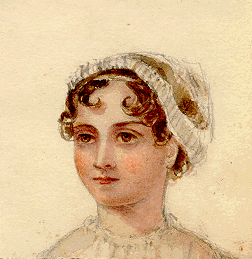
Watercolor portrait [of Jane
Austen?]
laid into the University of Pennsylvania's copy of
Jane Austen,
Emma (London 1816)
- JaneInfo
(Henry Churchyard's wonderful site, with annotated hypertexts),
- Melanie Kraft's Jane Austen
site, and
- James
Dawe's Jane Austen site.
- Recent Austen movies:
- Information is available about the Pride and Prejudice (BBC)
broadcast in the USA early in 1996 (A&E).
- Broadcast on A&E on Sunday,
February 16, 1997 (some repetitions followed, and more may follow yet again),
was a generally decent version of Emma (better than the
recent movie, until the end).
Here is the newly rediscovered and Hollywoodized Ms.
Austen
in her most recent portrait:
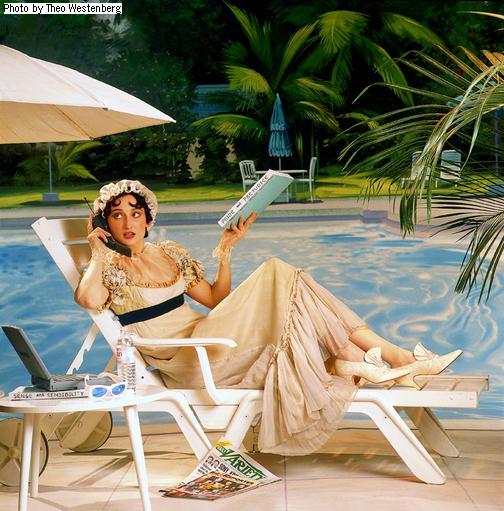
- Greenwood's Map
of London 1827 (a slow and pokey link)
- American
Authors on the Web (from the incredible home page of Mitsuharu Matsuoka,
Nagoya University)
- Nathaniel
Hawthorne
- The
Complete Writings and Pictures of Dante Gabriel Rossetti: A Hypermedia Research
Archive (Jerome McGann, University of Virginia)
- WOMDA: The Wilfred Owen
Multimedia Digital Archive and the even broader World War I literature site
- International Theodore Dreiser
Society; see also Theodore
Dreiser at the University of Pennsylvania Library and Nancy M.
Shawcross, curator, "Sister Carrie: 'A Strangely Strong Novel in a Queer
Milieu'"
- Kenneth
Rexroth, Communalism: From Its Origins to the Twentieth Century is
part of a larger online Rexroth archive
- Christian Classics Ethereal
Library--this site, hosted at Michigan's Calvin College, provides access to
many medieval and early modern texts, as well as more recent ones--e.g., the Early Church Fathers; early Church
Fathers are also available from a site calleded The Fathers of the
Church, which similarly offers many additional basic Christian texts
- A Digitized
Library of Southern Literature: Beginnings to 1920
- Modern American Poetry
(Cary Nelson, University of Illinois at Champaign-Urbana)
- CAPA:
Contemporary American Poetry Archive
- The Internet Poetry
Archive
- Braun and Schneider,
The History of Costume (ca. 1861-1880)
- Ten Thousand Dreams Interpreted: Gustavus Hindman Miller, What's in a Dream?
A Scientific and Practical Interpretation of Dreams (1901)
- Electronic Poetry
Center (University of Buffalo)
- The Moore
Collection of Underground Comix (California Polytechnic State University,
San Luis Obispo, CA)
- classics in translation;
and see also the classics listings on Traister's literature page
- the "wiretap" e-text archive
- Bibliomania
- Intergo Free
Library
- Kid A In Alphabet Land: An
Abecedarian Roller Coaster Ride Through The Phallocentric Obscurantism Of
Jacques Lacan
- Bureau of Public Secrets
(extensive selections from Ken Knabb's Situationist International
Anthology)
3. SOME GENERAL
SITES
Other text resources of interest to Traister can be found on his somewhat
fuller list of electronic journals as well as on
his more general literature page, mentioned
above.
- Here is a version of Chadwyck-Healey's Online English Poetry
Database available to Penn users only;
- the University of
Virginia, provides public access to electronic texts; by contrast, however,
Virginia also has this
link, which provides severely limited access to texts for non-UVa personnel
- Additional information about the product may be found at the Chadwyck-Healey Home Page.
- See also the The Electronic Text
Center at the University of Virginia --
- -- as well as its Electronic Archive of Early American
Fiction)
- The University of Michigan Humanities Text Initiative is worth a
look-see
- as is Michigan's Digital
Library
- and its Making of
America project --
- -- sponsored jointly with Cornell University, from
whom additional materals for the Making of America
are also available
- as a subset of Cornell's larger Digital Library site
- University of Toronto
English Library
- UNC-Chapel Hill's
MetaLab
- which includes sites such as e-publications
- a virtual exhibit
of 18th and 19th century African-American literature
- and the Library of
Southern Literature.
- The
Draft MLA guidelines on evaluating computer-related work in modern
languages is a document found at the University of Virginia's Institute for Advanced Technology
in the Humanities, a site well worth exploration for many
additional reasons --
- -- indicative of its range, see, e.g., IATH's related
readings resource
- Kali Tal, et al., The Sixties
Project
- or Duane Osheim, Plague and
Public Health in Renaissance Europe (the main link takes you, inter
alia, to the William Blake and Dante Gabriel Rosetti projects, as well as
to papers by Jerome McGann--and to other useful UVa sites, as well)
- Alan
Filreis is at work on a project (intensely interesting to Traister) whose
progress can be followed at The Fifties'
Thirties.
- A wide-ranging list of available online texts is
maintained by Jack Lynch.
Another e-text archive maintained by the University of Pennsylvania is
also worth exploring, as is another maintained by Penn's Library, the Schoenberg Center for Electronic
Text & Image site; and the On-line Book List. In
addition, see
- Rutgers's Center for
Electronic Texts in the Humanities
- Oxford's HUMBUL (Humanities Bulletin) (from Oxford University Computing
Services's Humanities page)
- The
English Server
- Electronic Library
- Open eBook Initiative
- Project Gutenberg
- A Celebration of Women
Writers
- Books
and Stories Online
- Western European
Literature (from WESS/ACRL/ALA)
- An
Online Literature Library
- The use of computers in the humanities (which includes, inter
alia, creation and analysis of electronic texts) is the special purview of
Humanist.
" . . . I
wonder if I might call your attention to an observation of the Emperor Marcus
Aurelius. He said: 'Does aught befall you? It is good. It is part of the
destiny of the Universe ordained for you from the beginning. All that befalls
you is part of the great web'."
I breathed a bit stertorously.
"He said
that, did he?"
"Yes, sir."
"Well, you can tell him from me he's an
ass."
P. G. Wodehouse, The Mating Game (1949), chap.
4

You can send Traister e-mail concerning this page at
traister@pobox.upenn.edu.

Return to Daniel Traister's Home Page.






